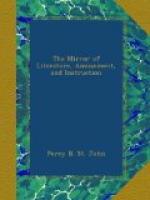This rapidity of explanation was almost too much for the old gentleman’s feelings. His limbs had been trembling with the agitation arising from thus reverting to days and events long passed; and he had entertained some hope from the language of the foreigner, that he might gain some intelligence concerning one that had been forgotten, but whose image was again revived in his memory. He had thought but lightly in the days of his youth of that which he then called folly, but more seriously in the days of his age of that same conduct which then he called vice. It would have been happiness to his soul, could an opportunity have been afforded him of making something like amends to the representatives of the injured, even though the injured had been long asleep in the grave. When all at once, therefore, the intelligence burst upon him, that one was living in whom he possessed an interest, and over whose destiny he should have watched, but whom he had neglected and forgotten, he felt his soul melt within him; and well it was for him that he found relief in tears. Surprised beyond measure was Colonel Rivolta, when he observed the effect produced on Mr. Martindale, and heard the old gentleman say with trembling voice:—“And that orphan, sir, is my daughter.” He paused for a minute or two, and his companion was too much astonished and interested to interrupt him: recovering himself, he continued: “For many years after that child was born, I had not the means of making any other provision for it than placing it under the care of the old woman of whom we have been speaking. I gave her such compensation as my circumstances then allowed; and as the mother died soon after the birth of the infant, I thought myself freed from all farther responsibility when I had made provision for the infant. I endeavoured, indeed, to forget the event altogether; and as I wished to form a respectable connexion in marriage, I took especial care to conceal this transgression. However, various circumstances prevented me from time to time from entering into the married state; and having within the last twelve years come into the possession of larger property than I had ever anticipated, it occurred to me that there should be living at Genoa a child of mine, then indeed long past childhood. I wrote to Genoa, and had no answer; I went to Genoa, and could find no trace either of my child or of the old woman to whose care I had entrusted her; and I was grieved not so much for the loss of my child, as for the lack of an opportunity of making some amends for my crime. I am delighted to hear that she lives. To-morrow I will see her.”
Upon this interesting disclosure hinge the principal incidents. In the course of these are some admirable pleasantries; especially a horse-race, and the description of Trimmerstone, in vol. i.; and the clerical prig, and a slight sketch of the dangle Tippetson, in vol. ii.
The Earl of Trimmerstone’s portrait, after old Martindale’s death is well drawn:




